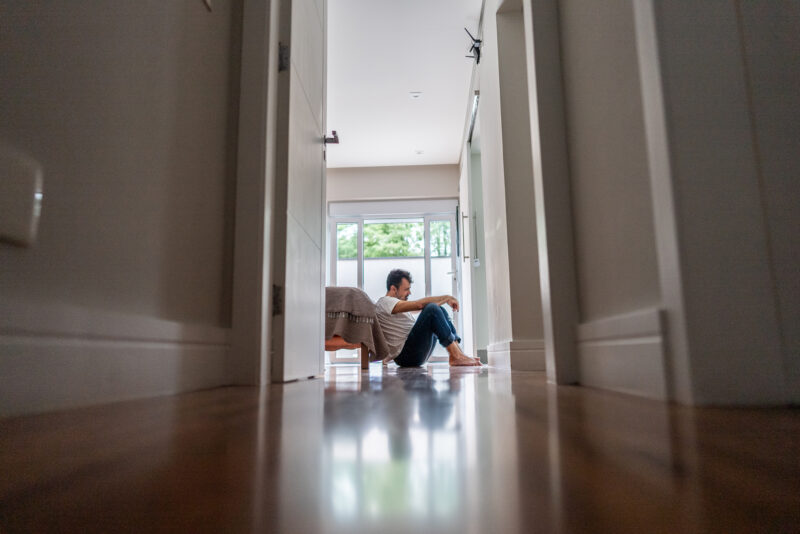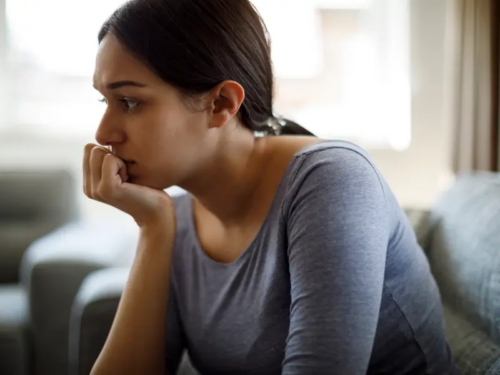
Table of Contents
Why You’re Feeling Lost in Life—and What to Do About It

Written By: Sarah Fielding

Clinically Reviewed By: Erin Husting
January 3, 2025
4 min.
Learn how to reconnect with yourself and what gives you purpose in life.
Learn more about our Clinical Review Process
Table of Contents
As we grow up, we inevitably face the challenges of making our own choices and navigating our path—challenges that lend to the near-universal experience of feeling lost in life. This experience can stem from various sources, like a breakup or unexpected job change that leaves you feeling ungrounded or an ongoing mental health disorder like depression, which can exacerbate negative emotions of feeling lost.
“When a person does not have clear goals or a sense of meaning, they may feel aimless,” says Charlie Health Group Facilitator Clary Figueroa, MSW. However, there are a number of coping mechanisms that can ease the distress of feeling lost in life. Read on to explore the common causes, coping mechanisms, and actionable steps to reclaim your sense of direction.

You don’t have to feel lost in life
Supportive therapy to help you with whatever comes next.
Common causes of feeling lost in life
“There are a lot of reasons why someone may feel lost, based on a number of internal and external factors,” says Charlie Health Senior Primary Therapist Sarah Lyter, LCPC, MA. “Some characteristics or events that may be likely to contribute to feeling lost include having a lack of direction or purpose, major life transitions and changes, pressure from society or culture, emotional and mental health factors, certain stressors, and a lack of support.” Here are some other common causes:
1. Negative self-perception
How you view yourself and your place in the world can greatly impact stability. As Figueroa explains, experiencing self-doubt or low self-confidence can make you feel less than and unsure of yourself.
2. Low energy
Similarly, your energy levels make a big difference. Even if you’re doing something you enjoy, experiencing burnout or getting overwhelmed with work and life can cause a sensation of being lost, adds Figueroa.
3. Mental health conditions
It’s worth further highlighting the impact mental health symptoms and disorders can have on feeling lost in life. Figueroa notes that someone experiencing depression, anxiety, or the impact of a traumatic experience might feel as “though they have no passions and that the things they loved no longer bring them happiness.” Lyter further breaks down the impact certain mental and behavioral health disorders can have, stating:
- Depression may magnify this feeling due to sadness, lack of interest, fatigue, and lowered motivation.
- Anxiety can also exacerbate these feelings due to difficulty focusing or feeling overwhelmed.
- Post-traumatic stress disorder (PTSD) can disrupt our safety and purpose, which may lead to feelings of being lost.
“The inability to feel fulfillment and purpose can cause someone to withdraw or isolate,” says Figueroa. “For some, it can be so intense to the point that people may struggle with suicidal ideation,” Lyter adds that substance use disorders, grief, and adjustment disorders can also cause feelings of being lost in life.
If you’re experiencing suicidal thoughts or are in danger of harming yourself, this is a mental health emergency. Contact The Suicide & Crisis Lifeline 24/7 by calling or texting 988.
How to cope with feeling lost in life
Feeling lost in life can be overwhelming, but healing is possible. Here, our experts explain how to cope with this feeling.
1. Practice self-reflection
One of the key points here is connecting with yourself and the things that light you up. This process could involve steps such as self-reflection through mindfulness practices like journaling, says Lyter. She adds that practicing self-care and radical acceptance can also help with this process. These techniques can open you up to life in a refreshing way while calming your body and mind to prepare for accepting a more sure feeling.
2. Use SMART goals
You might find that looking to the future also eases that feeling of being lost in your life. “Having and setting up goals for their life can keep them moving forward and motivated,” says Figueroa. On that note, Lyter recommends trying out SMART goals if you’re feeling lost in life. Here’s what you need to know about finding a SMART objective.
- Specific: Be clear about exactly what you want to achieve.
- Measurable: Determine which metrics you will measure progress with, whether it be time, quantity, or whatever is relevant.
- Achievable: Decide how you can reasonably attain this goal in the amount of time you have.
- Relevant: Think about how this goal connects with your other objectives in life.
- Time-bound: Determine how long you have to achieve this goal.
3. Seek out therapy
Coping with things in life, whether they be feeling lost or experiencing a mental health disorder, is challenging. A certified mental health professional can provide support in feeling more grounded in your life. “Seeking professional help is also a significant step that one can take to help navigate these difficult feelings, gain support, and learn skills to manage how their life is being impacted,” says Lyter.
If one-on-one therapy feels overwhelming, group therapy can also be beneficial, explains Figueroa. It provides a space to “connect with peers over shared experiences, find support, and the skills to manage their mental health.”

How Charlie Health can help
If feeling lost in life is bringing up negative emotions that take a toll on your mental health, Charlie Health is here to help. Charlie Health’s virtual Intensive Outpatient Program (IOP) provides more than once-weekly mental health treatment for people dealing with serious mental health conditions, including burnout, grief, a depressive disorder, and more. Our expert clinicians incorporate evidence-based therapies into individual counseling, family therapy, and group sessions. With this kind of holistic online therapy, managing your well-being is possible. Fill out the form below or give us a call to start your healing journey today.
References
https://www.samhsa.gov/grants/how-to-apply/forms-and-resources/developing-goals-measurable-objectives





